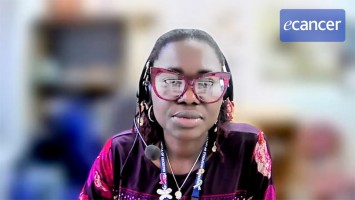Essentially it’s a very simple study, so essentially we’re looking at these unfit non-small cell lung cancer patients, stage 3b and 4, who were unfit for standard doublet chemotherapy. As you know, cancer immunotherapy treatment has transformed the treatment landscape for metastatic NSCLC patients but they are mainly recommended for fit patients. It’s important to remember that all the first line pivotal trials with immunotherapy, with or without chemotherapy, comparing against standard platinum-based chemotherapy were restricted to fit patients, VS 0 and 1, because of concerns about toxicity and concerns about treatment tolerance. So in reality we’ve got this big population of unfit NSCLC population, 40%, many of which just simply cannot be treated with standard doublet chemotherapy. They are predominantly elderly with multiple comorbid problems with multiple medications – diabetes, heart disease, lung disease, [inaudible] disease, cataract – and you would not treat with doublet because they just cannot tolerate them.
So currently they are treated with single agent chemotherapy which is better tolerated or they are offered best supportive care. So it’s a simple study, just focussing on this population who oncologists will just not give any standard platinum-based chemotherapy. It is an immunotherapy trial with first line atezolizumab comparing against single agent third-generation chemotherapy, gemcitabine or vinorelbine, as recommended by several treatment guidelines.
You saw the results, impressive results. IPSOS met its primary endpoint with a hazard ratio of 0.78, 22% reduction in death. More importantly, when they look at the one-year survival, 44%, and two-year survival of 24%, that two-year survival we are talking about one in four patients still alive at two years. So just imagine, these are an unfit, elderly population which historical data shows they have a median survival of less than 6 months.
We also looked at other parameters, obviously quality of life is very important for these symptomatic patients. We saw that there was stabilisation in many of the function domains and also we saw improvement in symptoms – cough, appetite loss, chest pain – which is significant because these are symptomatic patients living with a cancer, living with comorbid symptoms.
We looked at the toxicity and we saw not bad compared to historical data. Compared to chemotherapy, even though you get nearly double the duration of immunotherapy treatment, we saw the toxicity grade 3 and 4 were less. You saw early on, if I remember correctly, it was 33% versus 13%.
In terms of overall survival, in terms of quality of life, in terms of toxicity and after 20 years of clinical trials which have not brought much significant new development for this unfit population, this trial showed that immunotherapy can benefit them. The take-home message is we showed immunotherapy treatment works for unfit patients who are not suitable to be treated with standard platinum-based chemotherapy and the results are impressive when you look at not only the hazard ratio but you have to look at the one-year survival data and also the two-year survival data – one in four patients still alive. You also have to remember the quality of life outcome for these very symptomatic patients where we saw stabilisation over a long period of time, as you can see on my lecture presentation.
In summary, the IPSOS trial is the first immunotherapy trial with atezolizumab that shows it improves overall survival, regardless of histology, PD-L1 expression, performance status, in patients considered unfit for doublet platinum-based chemotherapy. Thank you.








